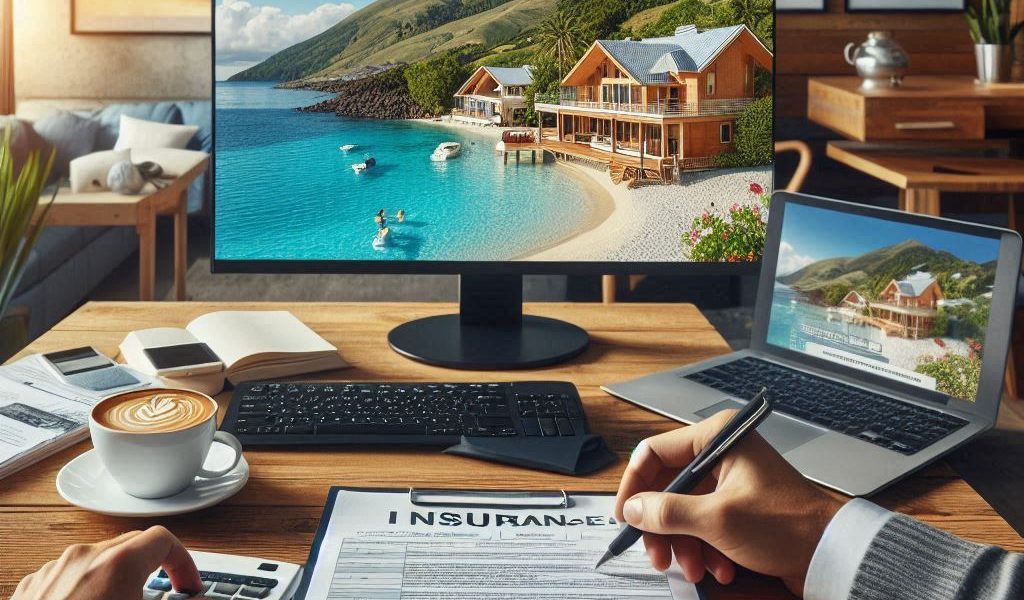Owning a vacation home or second property can be a dream come true. Whether it’s a cozy beach cabin, a mountain retreat, or a city condo, a second home offers a sanctuary from the stresses of daily life and can serve as an investment for the future. However, owning a vacation home also brings with it certain responsibilities—one of the most important being insurance.
Insuring your vacation home or second property is a crucial step in protecting your investment and ensuring peace of mind. Since second homes come with unique risks, such as occasional vacancy, seasonal weather-related issues, and higher chances of property damage, it’s essential to understand the insurance options available to you.
In this blog post, we’ll guide you through the key aspects of insuring your vacation home or second property. We’ll discuss the different types of insurance, what they cover, and why it’s important to get the right coverage for your needs.
Why Do You Need Insurance for Your Vacation Home?
A vacation home may seem like a low-risk property, but it’s subject to unique challenges that make insurance a necessity. Whether it’s a beachfront cottage, a mountain cabin, or a rural getaway, there are several reasons why vacation homes need specialized insurance coverage:
- Natural Disasters: Depending on the location of your vacation home, it may be at risk for specific natural disasters. Coastal properties may be prone to hurricanes, while mountain homes could be affected by wildfires or heavy snow. Floods, earthquakes, and even vandalism can all cause substantial damage.
- Vacancy: Unlike your primary residence, your vacation home may remain vacant for extended periods, which could make it more susceptible to issues like burglary, vandalism, or maintenance problems such as broken pipes.
- Rental Use: If you rent out your vacation home to short-term guests (via platforms like Airbnb or VRBO), you face additional risks, such as property damage, liability claims, and loss of rental income.
- Liability Risks: As the property owner, you are responsible for the safety of visitors. Accidents can happen, whether it’s a slip-and-fall injury or a fire caused by faulty equipment. Without proper liability insurance, you could be financially responsible for these incidents.
Types of Insurance for Your Vacation Home or Second Property
There are several types of insurance policies designed specifically to cover second homes or vacation properties. Let’s take a look at the most common insurance options for vacation homes and second properties.
1. Homeowners Insurance
Standard homeowners insurance can provide protection for your vacation home or second property in much the same way it does for your primary residence. It typically includes coverage for:
- Dwelling Coverage: Protects the structure of the home from damage caused by fire, theft, or other covered risks.
- Personal Property Coverage: Protects personal belongings inside the home, such as furniture, electronics, and clothing.
- Liability Protection: Covers legal costs and damages in case someone is injured on your property.
- Loss of Use: Provides reimbursement for living expenses if the property becomes uninhabitable due to damage (e.g., if a fire destroys the home).
While standard homeowners insurance may work for your second property, it’s important to verify whether the policy includes coverage for things specific to vacation homes, such as vacancy or rental activities.
2. Vacation Home Insurance
Vacation home insurance is a specialized form of homeowners insurance specifically tailored to second properties that may be left unoccupied for long periods. This insurance can cover the same types of risks as traditional homeowners insurance but may include specific provisions for:
- Extended Vacancy: Coverage for homes that remain vacant for weeks or months at a time.
- Seasonal Protection: In areas prone to severe weather conditions (snow, hurricanes), vacation home insurance may offer added protection against weather-related damages.
If your vacation home is only used seasonally, or if it is left vacant for long periods, vacation home insurance can provide the extra coverage you need.
3. Flood Insurance
If your vacation home is located in an area prone to flooding—whether near the coast, a river, or in a floodplain—you should strongly consider purchasing separate flood insurance. Standard homeowners insurance typically doesn’t cover flood damage, so it’s essential to have this extra layer of protection.
Flood insurance can protect your vacation home from water damage caused by storms, heavy rainfall, or rising water levels. Keep in mind that flood risk is higher in certain regions, and securing this coverage early on can save you from catastrophic losses.
4. Earthquake Insurance
If your vacation home is in an area that’s prone to earthquakes, you may need to purchase earthquake insurance separately. This coverage helps protect your property from damage caused by seismic activity, including structural damage and damage to your personal belongings.
Because earthquakes can cause severe damage to homes, especially in earthquake-prone areas like California, it’s important to assess your risk and consider this coverage if needed.
5. Rental Property Insurance
If you rent out your vacation home to guests on a short-term or long-term basis, you will need rental property insurance or landlord insurance. This type of insurance typically covers:
- Property Damage: Protection against damage to the structure or personal property caused by tenants or guests.
- Loss of Rental Income: If the property is damaged and cannot be rented out, this coverage can compensate you for the loss of income.
- Liability Protection: Covers accidents and injuries that occur on the property while rented.
If you rent out your vacation home to short-term renters (e.g., on Airbnb), you may also need a separate policy or endorsement to cover the unique risks of short-term rental use.
6. Umbrella Insurance
If you have substantial assets or liability risks, you might want to consider umbrella insurance. This provides additional liability coverage that goes beyond the limits of your existing home or rental insurance policies.
Umbrella insurance is particularly useful if you have high-value property, rent out your vacation home, or simply want extra protection for potential lawsuits. It offers extra peace of mind by providing coverage for major liability claims.
Factors to Consider When Insuring Your Vacation Home
When insuring your vacation home or second property, it’s important to take several factors into account to ensure you have the right coverage. Consider the following:
- Location: The location of your vacation home can significantly impact your insurance premiums. Properties in areas prone to natural disasters (such as hurricanes or earthquakes) may require additional coverage.
- Frequency of Use: If you rent out your vacation home or only use it part-time, you may need a different policy than someone who occupies it full-time.
- Value of Property and Belongings: Ensure that your policy reflects the value of the property itself as well as any valuables inside, such as electronics, furniture, or jewelry.
- Rental Activities: If you rent out the property to guests, consider additional coverage for property damage and liability, especially for short-term rentals.
- Security Features: Properties with better security systems (such as alarms, security cameras, and smoke detectors) may qualify for discounts on insurance premiums.
Conclusion
Insuring your vacation home or second property is a critical step in safeguarding your investment. Whether you need basic homeowners insurance, specialized vacation home coverage, flood insurance, or rental property protection, having the right insurance ensures that your property is protected from unexpected events. It also gives you peace of mind, knowing that you’re covered in the event of damage, loss, or liability.




